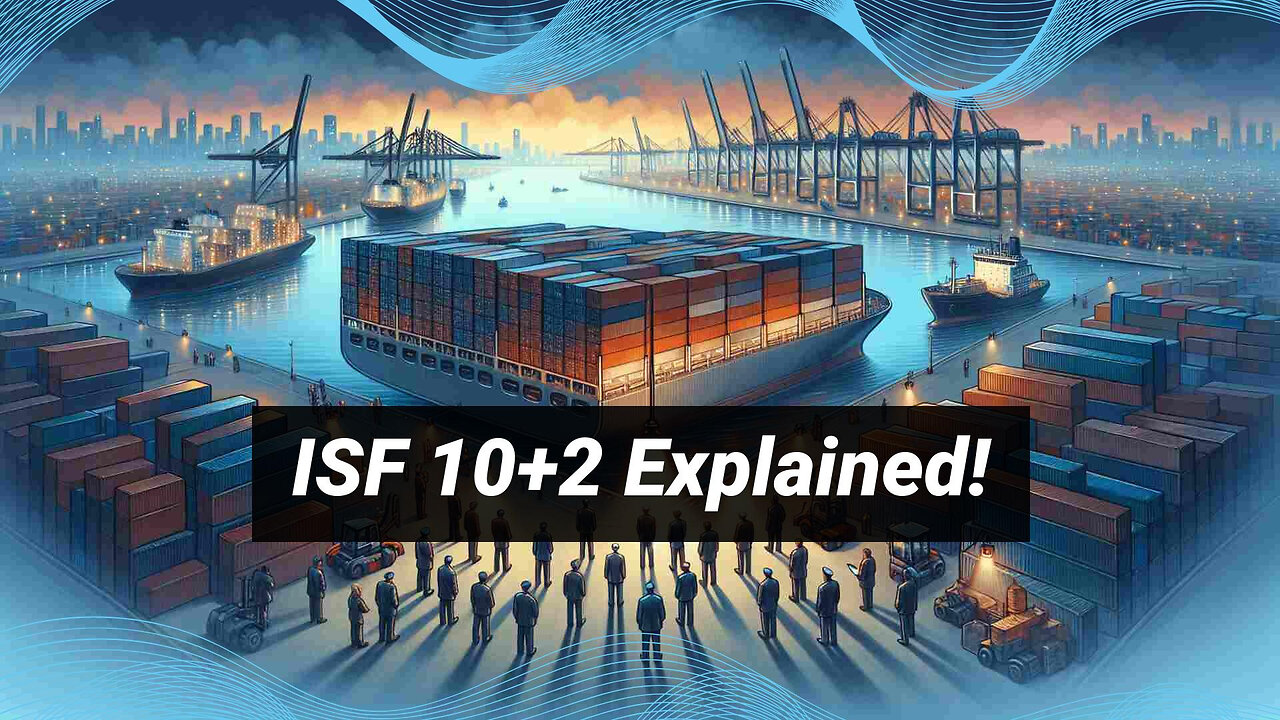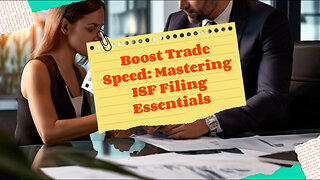Premium Only Content

Demystifying the ISF 10 2 Rule: A Comprehensive Guide for Importers
ISF Depot // 661-246-8217 // customs@isfdepot.com // www.isfdepot.com
The ISF 10+2 rule is a regulation established by the US Customs and Border Protection (CBP) to enhance cargo security for imported goods. Under this rule, importers are required to provide additional information to the CBP about their shipments prior to their arrival in the United States. The information included in the ISF filing consists of details about the imported goods, such as the shipper's information, consignee's information, the seller's information, and the manufacturer's information. Importers are also required to disclose the vessel name and voyage number, container stuffing location, and the seal number used to secure the shipment.
Complying with the ISF 10+2 rule is important for importers for several reasons. Firstly, it helps ensure the safety and security of the global supply chain by allowing the CBP to identify and mitigate potential risks before the cargo reaches the United States. Secondly, non-compliance can result in penalties and delays in customs clearance, with fines imposed by the CBP potentially reaching as high as $5,000 per violation. In addition, non-compliance may lead to holds being placed on shipments, causing significant delays and additional costs.
The ISF filing can benefit importers by streamlining their supply chain operations and improving efficiency. By providing accurate and complete information, importers can enable faster customs clearance, reduce the chances of cargo inspections, and ultimately achieve shorter lead times and cost savings. Furthermore, the ISF filing allows importers to proactively identify and address any potential issues or discrepancies in the cargo documentation before the goods arrive in the United States, thus preventing disruptions in the customs clearance process.
To ensure compliance with the ISF 10+2 rule, importers should collaborate closely with their customs brokerage service providers. These professionals specialize in customs regulations and can guide importers through the ISF filing process, ensuring accurate and timely submission. By leveraging advanced technologies and automated systems, customs brokerage service providers can streamline the ISF filing process, minimize errors, and provide real-time updates on the status of ISF filings. Importers can rely on these providers to help them address any issues that may arise during the filing process.
In conclusion, understanding and complying with the ISF 10+2 rule is crucial for importers engaged in international trade. By fulfilling the requirements of the ISF filing, importers can contribute to the security of the global supply chain, avoid penalties and delays, streamline their operations, and maintain a smooth customs clearance process.
#usimportbond #isfcustomsbroker #uscustomsclearing #isfentry
Video Disclaimer Here: This tutorial is independent and not affiliated with any US governmental entities.
-
 3:51
3:51
ISF Depot
8 days agoUnlocking Trade Facilitation: The Power of Importer Security Filing
8 -
 26:00
26:00
ariellescarcella
12 hours agoGaslighting The TikTok Generation Into Chaos : Psych Deep Dive
1.84K3 -
 55:28
55:28
SGT Report
10 hours agoTHE MIRACLE OF CHLORINE DIOXIDE -- Kerri Rivera
18.5K27 -
 LIVE
LIVE
BEK TV
2 days agoTrent Loos in the Morning - 8/18/2025
59 watching -
 22:52
22:52
GritsGG
16 hours agoSpectating Solos & Found MnK Demon!
19K2 -
 LIVE
LIVE
FyrBorne
20 hours ago🔴Warzone M&K Sniping: Warzone is Ending Again? (Rumor Mills Might Be Right)
44 watching -
 LIVE
LIVE
Lofi Girl
2 years agoSynthwave Radio 🌌 - beats to chill/game to
675 watching -
 LIVE
LIVE
BBQPenguin_
2 hours agoDragon ball Z -The Saiyan Saga
19 watching -
 19:27
19:27
The Pascal Show
19 hours ago $0.96 earned'SHE'S A GOOD MOM!' Missing Emmanuel Haro's Aunt Speaks Out In Now DELETED Video!
15.7K2 -
 20:54
20:54
Forrest Galante
22 hours agoPrivate Tour of World's Largest Animal Sanctuary
97.5K22